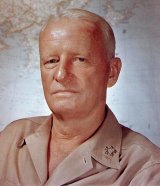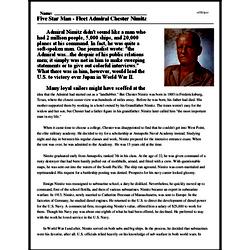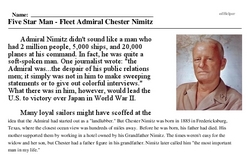Five Star Man - Fleet Admiral Chester Nimitz
Chester Nimitz
Reading Comprehension for February 24
Admiral Nimitz didn't sound like a man who had 2 million people, 5,000 ships, and 20,000 planes at his command. In fact, he was quite a soft-spoken man. One journalist wrote: "the Admiral was...the despair of his public relations men; it simply was not in him to make sweeping statements or to give out colorful interviews." What there was in him, however, would lead the U.S. to victory over Japan in World War II.
Many loyal sailors might have scoffed at the idea that the Admiral had started out as a "landlubber." But Chester Nimitz was born in 1885 in Fredericksburg, Texas, where the closest ocean view was hundreds of miles away. Before he was born, his father had died. His mother supported them by working in a hotel owned by his Grandfather Nimitz. The times weren't easy for the widow and her son, but Chester had a father figure in his grandfather. Nimitz later called him "the most important man in my life."
When it came time to choose a college, Chester was disappointed to find that he couldn't get into West Point, the elite military academy. He decided to try for a scholarship at Annapolis Naval Academy instead. Studying night and day in between his regular classes and work, Nimitz prepared for the intensive entrance exam. When the test was over, he was admitted to the Academy. He was 15 years old at the time.
Nimitz graduated early from Annapolis, ranked 7th in his class. At the age of 22, he was given command of a rusty destroyer that had been hastily pulled out of mothballs, armed, and fitted with a crew. With questionable maps, he was sent out into the waters of the South Pacific. The ship ran aground. Nimitz was court-martialed and reprimanded. His request for a battleship posting was denied. Prospects for his navy career looked gloomy.
Ensign Nimitz was reassigned to submarine school, a duty he disliked. Nevertheless, he quickly moved up to command, first of the school flotilla, and then of various submarines. Nimitz became an expert in submarine warfare. In 1913, Nimitz, newly married to Catherine Freeman of Massachusetts, was sent to Europe. In the factories of Germany, he studied diesel engines. He returned to the U.S. to direct the development of diesel power for the U.S. Navy. A commercial firm, recognizing Nimitz's value, offered him a salary of $25,000 to work for them. Though his Navy pay was about one-eighth of what he had been offered, he declined. He preferred to stay with the work he loved-service in the U.S. Navy.




